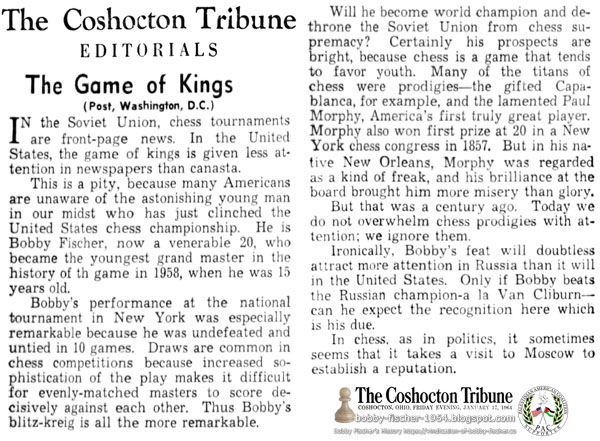The Tribune Coshocton, Ohio Friday, January 17, 1964 - Page 4
The Game of Kings
IN the Soviet Union, chess tournaments are front-page news. In the United States, the game of kings is given less attention in newspapers than canasta.
This is a pity, because many Americans are unaware of the astonishing young man in our midst who has just clinched the United States championship. His is Bobby Fischer, now a venerable 20, who became the youngest grand master in the history of the game in 1958, when he was 15 years old.
Bobby's performance at the national tournament in New York was especially remarkable because he was undefeated and untied in 10 games. Draws are common in chess competitions because increased sophistication of the play makes it difficult for evenly-matched masters to score decisively against each other. Thus Bobby's blitzkrieg is all the more remarkable.
Will he become world champion and dethrone the Soviet Union from chess supremacy? Certainly his prospects are bright, because chess is a game that tends to favor youth. Many of the titans of chess were prodigies—the gifted Capablanca, for example, and the lamented Paul Morphy, America's first truly great player. Morphy also won first prize at 20 in a New York chess congress in 1857. But in his native New Orleans, Morphy was regarded as a kind of freak, and his brilliance at the board brought him more misery than glory.
But that was a century ago. Today we do not overwhelm chess prodigies with attention; we ignore them.
Ironically, Bobby's feat will doubtless attract more attention in Russia than it will in the United States. Only if Bobby beats the Russian champion-a la Van Cliburn—can he expect the recognition here which is his due.
In chess, as in politics, it sometimes seems that it takes a visit to Moscow to establish a reputation.























